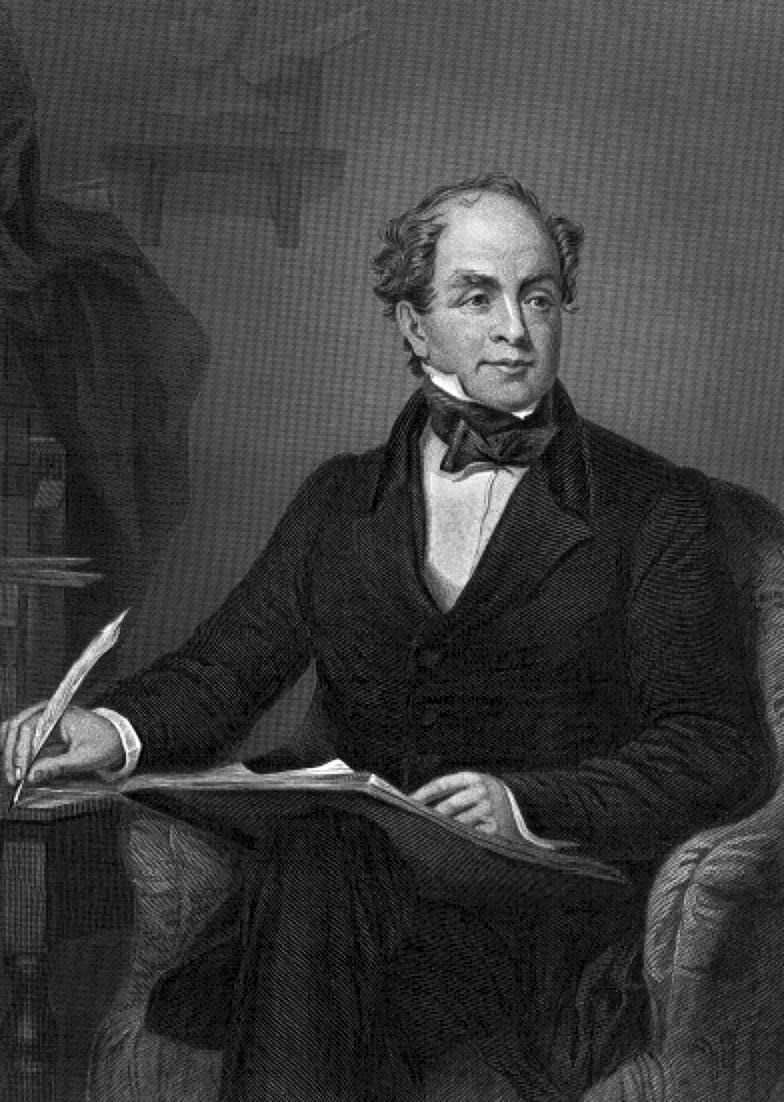
Thomas Moore
Thomas Moore and the Drama of Irish Protest.
Best known as friend of Lord Byron’s and as author of Irish Melodies and Lalla Rookh, Thomas Moore was also a brilliant satirist and a capable playwright. In both of his plays he subtly addressed the politics of the Irish Problem while fully exploiting the current musical requirements of Melodrama. In a third melodrama, Captain Rock adapted from his prose narrative, Moore’s characteristic implementation of irony and hoax are still predominant.
Moore's first play, The Gipsy Prince (Haymarket, 24 July1801), enjoyed a run of ten nights, the second longest run of the season. Although the play pretends to be about the persecution of the gipsies in Spain during the Inquisition, it becomes immediately clear, however, that the Inquisitors are British and the gipsies are Irish.
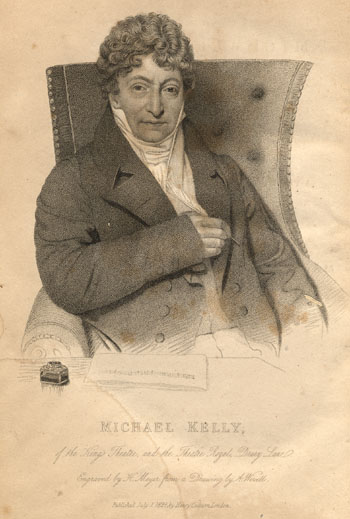 Michael Kelly, who composed the musical score, played the title role. Although his English pronunciation was faultless, he chose to perform his role with a heavy Irish brogue. Even before Kelly appeared on stage, his overture exposed the Irish protest with a repeated five-note motif AAADA mimicking the signal whistle used by the whiteboys ( Buachaillí Bána) to provoke the British troops to a nocturnal chase through the brambles. Once recognized for having circumvented censorship, the play could not be revived the following season. Moore quickly produced a prose version of the story, which pretended to be translated from an original Spanish source for the play.
Michael Kelly, who composed the musical score, played the title role. Although his English pronunciation was faultless, he chose to perform his role with a heavy Irish brogue. Even before Kelly appeared on stage, his overture exposed the Irish protest with a repeated five-note motif AAADA mimicking the signal whistle used by the whiteboys ( Buachaillí Bána) to provoke the British troops to a nocturnal chase through the brambles. Once recognized for having circumvented censorship, the play could not be revived the following season. Moore quickly produced a prose version of the story, which pretended to be translated from an original Spanish source for the play.
Moore’s later play, M.P.; or, The Bluestocking (Drury Lane 30 September 1811), again took up British/Irish tensions, specifically the failure of the Prince Regent to support the Catholic Emancipation. This one secured the approval of the Examiner of Plays only after heavy revisions. Moore’s Captain Rock (Surrey, 14 August 1826) was adapted for the stage as a comic melodrama – Captain Rock, the presumed leader of Irish insurrection, was the bane of British militia in Ireland, held to be responsible for hundreds skirmishes. Flyers, nailed to trees or fence posts, would announce “Captain Rock will meet his troops in the town square at dawn” or “Troops with rally in the woods at midnight, by order of Captain Rock.” Because his loyal followers kept his identity concealed, efforts to capture the elusive Captain Rock were futile. His identity, when it was at last exposed, was that he didn’t exist at all. He was merely a name to conjure with, a hoax to torment the British militia.
Transcribed for the first time from the original manuscript, and made available at Romantic Circles, the complete text of Moore's The Gipsy Prince the complete text of Moore's The Gipsy Prince together with a new printing of his "Spanish" hoax are available at Romantic Circles
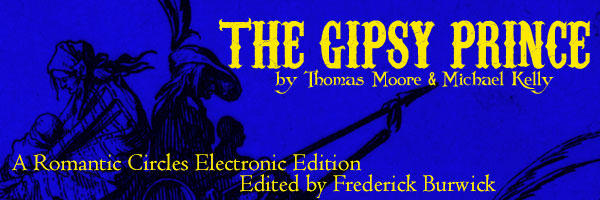
The Gipsy Prince: Notes on the Musical Score, by Stephen Pu
Recording cast (June 20, 2009, Balch Auditorium, Scripps College)
Musical Director: Stephen Pu
.
,%20Musical%20Director.jpg)
Stephen Pu
Gipsy Prince = Ian Martyn
Rincon = Michael Elliott
Don Roderick (the Inquisitor) = Stephen Pu
Don Dominick (the Corrigidor) = Michael Elliott
Antonia = Sarah Harrell
Poppee = Jenna Pinkham
Lachimee = Autumn Burdick
Gipsies, Peasants, and Aguazil; Chorus:
Sopranos: Sarah Harrell, Jenna Pinkham
Altos: Autumn Burdick, Gemma Levine
Tenors: Ian Martyn, Michael Elliott
Basses: James Burdick, Leo Martyn
Pianists: Yuko Shiina, Stephen Pu
1. Overture ( Stephen Pu) Play/Download
NOTE: An opening “Pastorale” establishes a calm beginning, with a few sudden changes in rhythm. The ensuing “Allegro” repeats the five-note motif AAADA mimicking the signal whistle used by the whiteboys ( Buachaillí Bána) to provoke the British troops to a nocturnal chase through the brambles. Agitating for tenant farmer land rights, the whiteboys donned white smocks in their nightly raids which they would then remove when they had lured the soldiers far into the brush or marsh. The chase is conjured in the relentlessly continuous motion of the overture. At times, the music calls for comical, loud-then-quiet contrast. At other points, it calls for a full-bodied sound. The overture ends with repeated, almost relentless iterations of D Major, the piece’s tonal center. This overture is designed to show off the virtuoso skills of a pianoforte player.
2. Happy the Heart that love has blest (Chorus, Michael Elliott) Play/Download
Happy the hearts that love has blest
With such a tie, so sweet as this:
All their nights are nights of rest,
And all their days are days of bliss.
Never shall time their love eclipse,
Tho’ it may steal some fire away;
But, like the roses on their lips,
Their joys shall mellow not decay.
Rincon: Zounds! What a merry-go-frisk-away here is.
To it, my pigeons, as brisk as you can
If one of you wishes a partner, my dearies,
Or, damme, if two of you – I am the Man!
Chorus: Happy the hearts &c.
NOTE: Kelly’s characteristic closeness to a tonal center appears again in this pleasant chorus. Deliberately detached rhythms set to the text “their joys shall soften” contrast with previously connected melodic lines. The notation in the solo portion includes no beams to connect notes, thus encouraging shorter, detached singing.
3. Rincon, solo I remember ( Michael Elliott) Play/Download
I remember
‘Twas last December,
When the tips, Ma’am,
Of old women’s noses
Blush like roses,
Or your lips, Ma’am –
‘Twas then – I remember
‘Twas, last November –
No, just December,
When an old mumbling witch,
Whose gums could scarcely nibble,
Mutter’d from a ditch,
And told me like a Sibyll!
“Rincon, my boy, thou’lt make a row!”
She said to me, as I’m saying now;
And said I
In reply –
Now [No] a – says she
To me
“Thou’lt be the babe of wonder!
“Be thunder!
“Be lightning;
“The universe frightening,
“My cradle (she said) had been a large cannon!”
By the bye,
Thought I
A very fine thing to nurse a man in!
‘Twas this they repute,
Taught my fancy to shoot,
And made me more flashy than others,
I’m the son
Of a gun,
And bullets are my sisters and brothers!
NOTE: Moore, who composed the music as well as lyrics to Rincon's solo, introduces here chromatic tones that expand the melodic and harmonic possibilities from what was previously practiced on the London stage. Remarkably, Moore chooses to stay close to his original tonal center, even while using chromatic tones. The strangeness of the chromatic tones matches the oddness of the character who sings a violent, humorous text. This song is a rare instance of the through-composed, non-strophic song.
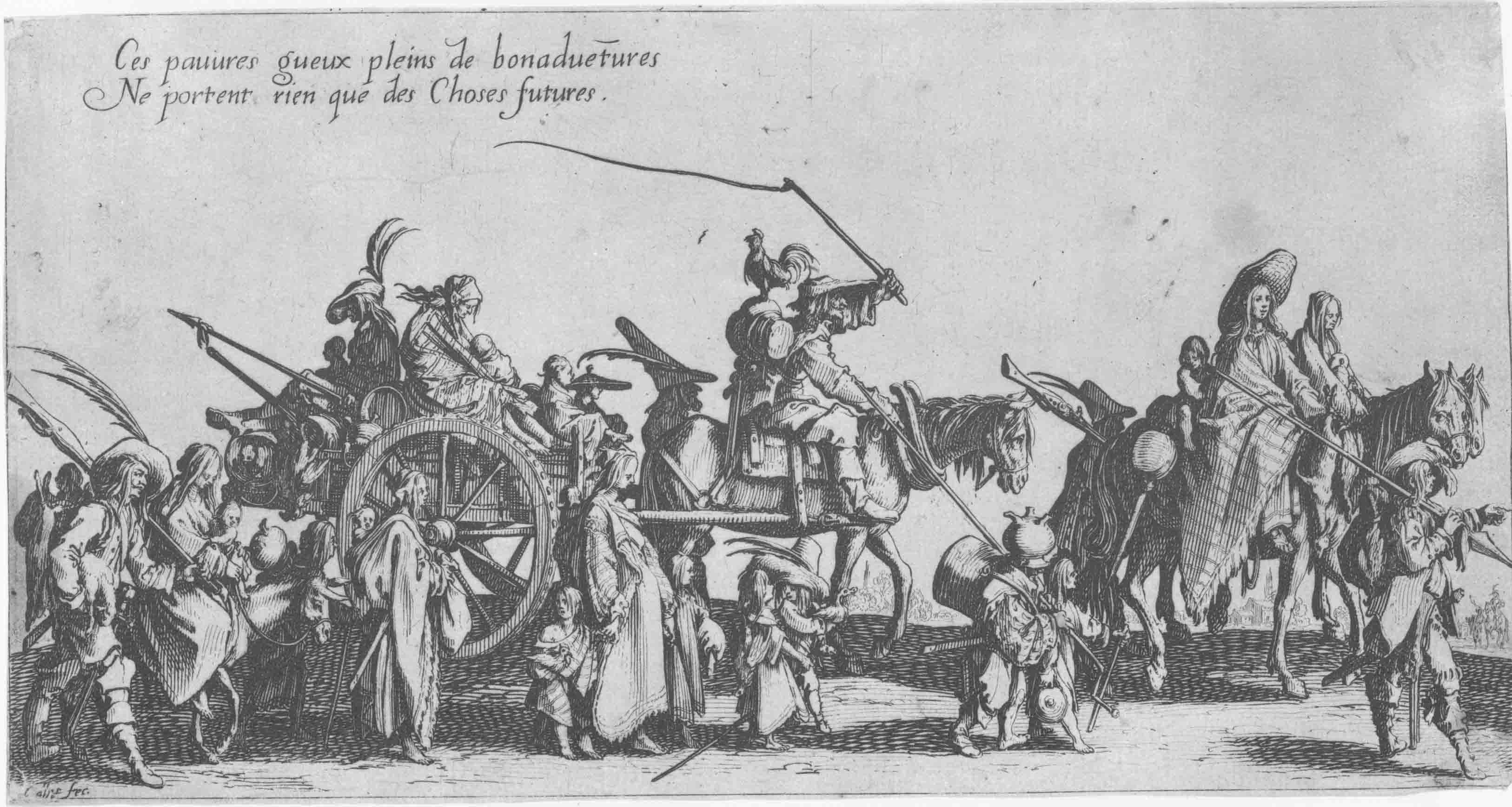
Gypsies on the Road, by Jacques Callot
4. Quartetto of Gipsies: Bleak rains may fall (Stephen Pu, Michael Elliot, Ian Martyn, James Burdick) Play/Download
Bleak rains may fall, and winds whistle over us,
Nothing but heaven and darkness to cover us.
Merry we still fly,
Where our fates lead us,
Winter or chill sky
Cannot impede us.
NOTE: Expertly crafted harmonies provide continuity in this quartet. Slower, drawn out lines are juxtaposed with fast, spritely rhythms, and a feel of close ensemble is maintained throughout.
5. Gipsy Prince, solo: I’ve roam’d thro’ many a wearied round (Ian Martyn) Play/Download
I have roam’d through many a weary round,
I have wander’d East and West;
Pleasure in every clime, I found,
But sought in vain for rest.
While glory sighs for other spheres,
I see; that one’s too wide,
And think the home, which love endears,
Were worth the world beside.
NOTE: Marked “Rondo Andante,” this song evokes a dance. Lilting rhythms and imitative structures give the song a predictable structure, while ornaments in the vocal part showcase the technical capacity of the singer.
6. Antonia’s Guitar Song, Sweet oh sweet (Trio: Sarah Harrell, Stephen Pu, Michael Elliott ) Play/Download
Antonia . Sweet, oh! Sweet the spring is coming,
Nature’s heavenly blush appears;
Earth expands her breathing bosom,
To be bath’s in vernal tears.
Sweet, oh! Sweet the spring is coming,
Nature’s heavenly blush appears;
Don Roderick Stop, oh! Stop your plaguy strumming,
Or you will kill me thro’ my ears,
Don Dominick . Bravo! Delightful!
Don Roderick . Bah! ‘tis frightful!
Trio Sweet, oh! Sweet the spring is coming,
Nature’s heavenly blush appears;
Earth expands her breathing bosom,
To be bath’s in vernal tears.
NOTE: Lyrical lines in the soprano part combine with admiring sighs from the tenor, and this is set against a complaining baritone part comprised of short, exclamatory protests. The charm of this song lies in the combination of characters and their independent moods.
7. Antonia and Gipsy Prince, duet, Good Night, good Night (Duet: Sarah Harrell and Ian Martyn ) Play/Download
Antonia . Good night! Good night, I must away,
Altho’ my heart would bid me stay.
Gipsy Prince . Oh Lady, say “good night” once more.
And I’ll repeat it o’er and o’er.
Both . Till the first glance of dawning light,
Should find us saying still “good night.”
Good night! good night!
NOTE: This is one of Kelly’s love duets. The two voices sing one verse each before combining in close harmony. A tender lilt in the song evokes the spirit of a lullaby.
8) Aguazils and Gipsy chorus: In the name and glory of the Inquisitory (Aguazils: James Burdick, Michael Elliott, Ian Martyn, Leo Martyn; Gypsies: Autumn Burdick, Sarah Harrell, Gemma Levine, Jenna Pinkham) Play/Download
Aguazils: In the name and glory
Of the Inquisitory
Stand we command
Gipsy chorus : See they’ve surpriz’d us.
What shall we do?
Why need we fear
Your brow severe?
What crime is ours?
Aguazils : No fuss
But come with us
And yield to Murcia’s powers.
Gipsy chorus : What should we fear?
The guilty only fear
the hand of lofty pow’r.
Aguazils : We arrest by Laws or Laws command
Gipsy chorus :
No crime is ours
To dread your pow’rs
No, no, no
Aguazils :
Thus you we arrest
By laws command
Come, come, come
NOTE: In this Double Chorus, Kelly entertains the notion that gipsy music is lighthearted, even frivolous, in spite of serious threats or hardships. The chorus of Aguazils ("In the name and glory of the Inquisitory) has a military tempo, answered by a round for four soprano gipsy parts. Imitative structures abound between the two choruses. Even though the melodic material appears similar between the choruses, the words leave no doubt as to what each chorus is doing.
9) Antonia, solo: Yes now I shall think ( Sarah Harrell): Play/Download
Yes now I shall think of that heartbroken maid,
Where in days of my childhood I knew.
All night she would weep in the cold willow shade
And her tears mingled warm with the dew.
I’ve heard her exclaim as her wild bed she prest,
Her wild bed all dripping and chill,
I’ve heard her exclaim as her wild bed she prest,
In pity poor bosom lie still.
The Youth whom she lov’d had been torn from her arms,
By a fate too severely unkind;
Thus wither’d alas was the rose of her charms.
And clouded the beams of her mind:
Sweet mourner thy fortunes may haply be mine,
And I fill in my heart that they will;
Then sad shall I say with a sorrow like thine,
In pity fond bosom lie still.
NOTE: A lyrical melodic line is infused with opportunities to show off a lead soprano in this solo. The case in point is a high G with a fermata on the second syllable of the word “exclaim,” which, in the second verse, falls on the first syllable of “fortunes.”
10) Poppee, Lachimee, chorus: Where Gipsy Gone (Jenna Pinkham, Autumn Burdick) Play/Download
Poppee.
Where Gipsy gone,
Night falling on,
Fly, to de tents in der willows fly—
See, now dey creep
From yonder steep,
No fearee now de watchful eye.
Lachimee. Here we spread,
In de willows our bed,
Fly – fly – fly to de willows fly.
Hush, hush, hum,
De gipsies come –
No fearee now de watchful eye.
Poppee. Oh! Gipsy man no care for wind,
In summer’s glow,
Or winter snow,
Gipsy man no diff’rence find,
His sunshine is de happy mind.
Chorus. Hush, hush, hum,
We gipsies come –
Fly, fly, fly, to de willows fly.
Soft we creep
To our tents of sleep,
Seal’d is now the watchful eye.
NOTE: Onomatopoetic devices, like “Hush hush hush hum” inform the performance, even in the absence of dynamic markings in the score.
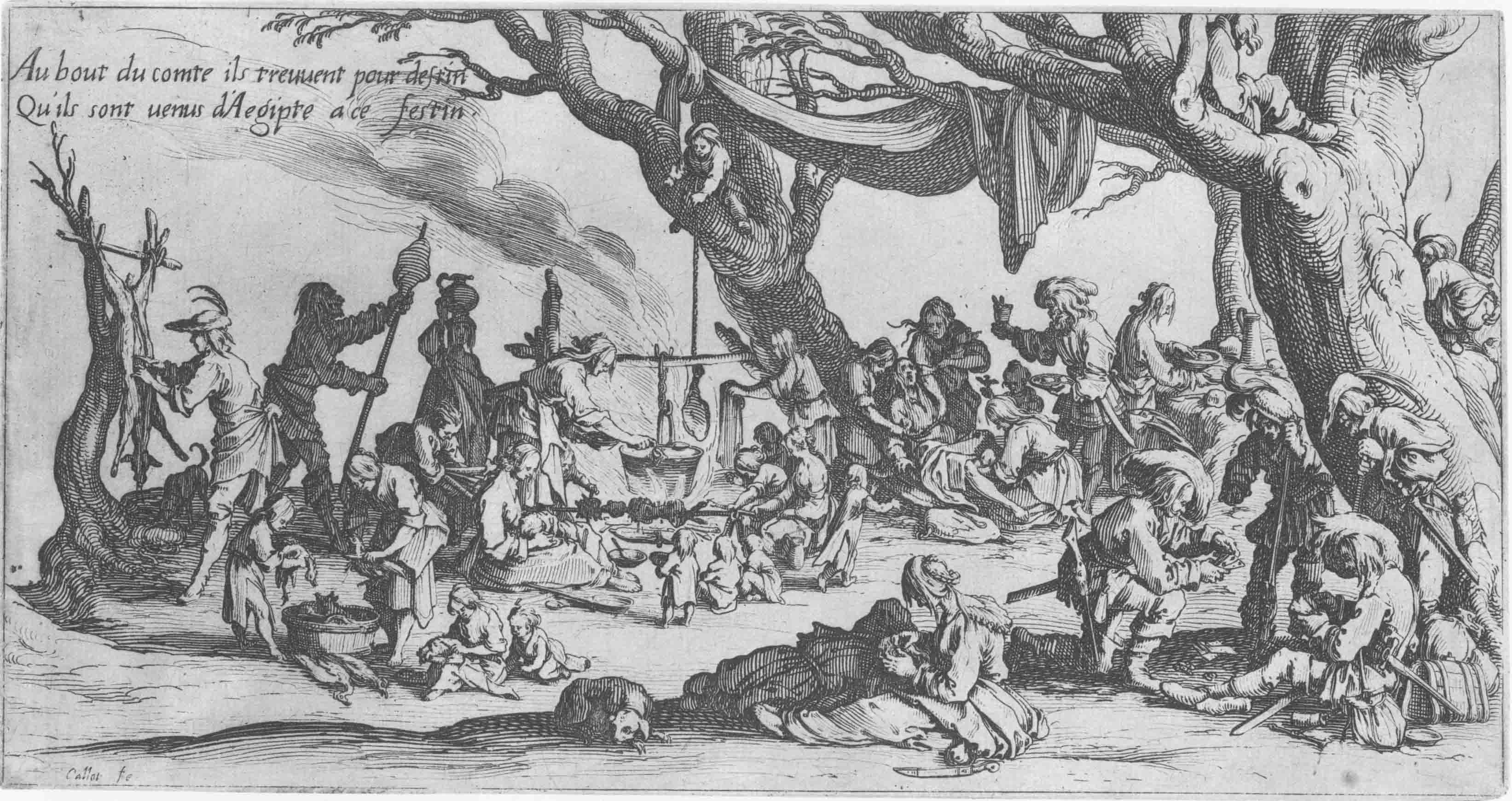
Gypsy Camp, by Jacques Callot
11) Poppee, solo: Oh me was born to wander ( Jenna Pinkham) Play/Download
Oh me was born to wander,
No money me have got –
When father stole de gander,
The mother boil de pot;
While me sing fal la la la la
Fooma molta junga.
Under a hedge, one summer,
Me sat – Oh, great de heat;
Dere come little drummer,
And gay rub dub he beat,
Den me sing, &c.
Den me leave hedge and daddy,
Wid drummer lad to go,
But faithless drummer laddy,
Have left me full of woe.
Still me sing, &c.
NOTE: Here again, Kelly entertains the predisposition for gipsy music to be lighthearted and fanciful. What would otherwise be a sad story of a faithless lover is juxtaposed with a fast and cheerful “fa la la,” and a phrase of playful nonsense text.
12. Rincon and Poppee, Duet: [Paesiello] Before I fall to kissing you ( Jenna Pinkham, Michael Elliott) Play/Download
Rincon. Before I fall to kissing you girl
Here’s a drop to baptize you.
Wine’s the thing to christen you girl,
Water I’d never advise you.
Poh! poh! poh! poh! poh! poh!
Water I’d never advise you.
[Fye, fye, you’re quite a sinner, girl.
You’re not the thing for me the;
Without some grace, no dinner, girl,
I never could kiss with a heathen!
No, no, no, no.
I could never kiss with a heathen.]
Poppee . Eh! Have you got no shame now, man,
For why you talk of christen?
You give poor girl good name now, man.
But you’d take it away by kissin!
Iss, iss, iss, iss,
You’d take it away by kissin.
Rincon . No, you rogue, I love you dearly,
As well as my bottle or – nearly.
Poppee . But bottle thrown by when you crack ‘um,
And lips forgot when you smack ‘um.
Rincon . Come along, my dingy Miss,
Your face is such golden money,
It must be stamp’d with a kiss,
It shall, by all that’s sunny/
Poppee . Get along to you fine white Miss,
I not de girl for you money;
You may stamp and fret to kiss,
You shant, by all dat’s sunny.
Rincon . By the cowl of St. Bridget,
My heart’s in a fidget;
Betwitter’d, befrittetter’d,
Besnivell’d, bedevill’d.
Poppee . Eh! You come talk, you tipsy man,
You not know what you about;
Rincon . I’ll touch your hand, sweet Gipsy Ma’am,
But first I’ll touch your mouth.
Poppee . You must touch de hand of Gipsey, Man,
Before you touch her mout.
NOTE: A lecherous man pursues a gipsy girl for a kiss in this song of outright rejection. Kelly makes use again of onomatopoetic devices: the hissing “iss” and the contemptuous “poh."
13. Antonia, Rincon, Gipsy Prince, Trio: Oh! in pity hear me suing ( Sarah Harrell, Michael Elliott, and Ian Martyn) Play/Download
Antonia . Oh! in pity hear me suing,
By compassion’s dearest sigh.
Rincon . Oh! I see, what she’d be doing,
Well, we’ll talk on’t by and by
Antonia . Dearest Sir --
Rincon . The deuce is in it.
Antonia . Nay, but a minute --
Gipsy Prince . Stop, knave, at your peril, stir.
Rincon . Curse him, here he is again.
Gipsy Prince . Back, back meddler to your den.
Rincon . Oh! dear --
NOTE: “Agitato” is the directive for this song, which is also the only song in the production to begin in a minor mode. Repetition of words and juxtaposition of contrasting characters comes to the fore again as all three voices sing together on different words: “hush,” “here,” and “help.”
14. Duet: Yes! for thee too charming Stranger ( Sarah Harrell and Ian Martyn) Play/Download
Gipsy Prince . In here, in here --
Hush, hush, they’ll hear
Antonia . Yes, for thee too charming stranger,
I could smile at every danger.
Gipsy Prince . ‘Tis for me, a lonely stranger,
Thou dost smile at every danger.
Antonia . Far, oh far, thy steps may wander
Ere thou find a heart that’s fonder.
Gipsy Prince . Far, oh far, my steps may wander
Ere I find a heart that’s fonder.
Antonia . No, no, whatever fate is thine,
Thou canst not meet a love like mine --
Gipsy Prince. No, no, whatever fate is mine,
I ne’er can meet a love like thine.
NOTE: Another love duet features close harmonies sung on similar texts, set to identical rhythms. Marked “Largo,” sighing motifs indicate the lovers' feelings, further emphasized by the piano’s supporting role.
15. Finale: Gipsy Prince, Antonia , chorus The Gipsy Prince no more shall roam. Play/Download
The Gipsy Prince no more shall roam,
His sorrows all beguil’d to rest;
The arms of love shall be his home,
And joy his ever-smiling guest.
NOTE: One last time, lighthearted music is sung by a chorus of gipsies. Dynamic contrasts highlight, from one phrase to the next, the difference between quiet excitement and rapturous joy, fitting of a happy ending.

 Michael Kelly, who composed the musical score, played the title role. Although his English pronunciation was faultless, he chose to perform his role with a heavy Irish brogue. Even before Kelly appeared on stage, his overture exposed the Irish protest with a repeated five-note motif AAADA mimicking the signal whistle used by the whiteboys ( Buachaillí Bána) to provoke the British troops to a nocturnal chase through the brambles. Once recognized for having circumvented censorship, the play could not be revived the following season. Moore quickly produced a prose version of the story, which pretended to be translated from an original Spanish source for the play.
Michael Kelly, who composed the musical score, played the title role. Although his English pronunciation was faultless, he chose to perform his role with a heavy Irish brogue. Even before Kelly appeared on stage, his overture exposed the Irish protest with a repeated five-note motif AAADA mimicking the signal whistle used by the whiteboys ( Buachaillí Bána) to provoke the British troops to a nocturnal chase through the brambles. Once recognized for having circumvented censorship, the play could not be revived the following season. Moore quickly produced a prose version of the story, which pretended to be translated from an original Spanish source for the play.
,%20Musical%20Director.jpg)

